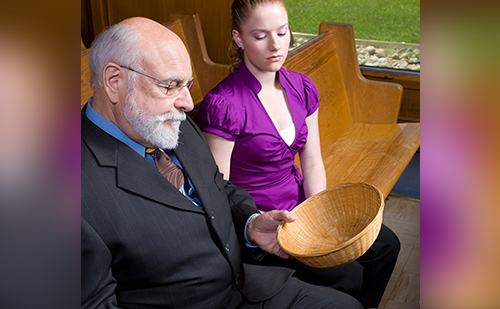I can’t tell you how many pastors have said to me, “I don’t want to know what my members give. That’s between them and God.”
But the reality is, if you’re the lead pastor, what your members give IS your business.
When I was a church planter, my trainer asked us, “What is the #1 way you can tell if someone is committed to your church?” We responded with answers all over the map … attendance, serving, etc. The trainer’s response: “Money.”
Then he asked what the second most reliable way you can tell if someone’s committed to the church. Again “The money.”
And the third most reliable is the same.
It turns out, after nearly 40 years in the pulpit, that I can tell you he’s 100% correct. Sacrificial giving is the most reliable way to tell if someone is committed to the church’s mission and vision.
I regularly hear, “But that’s between them and God” and “I’m afraid I’d treat them different.” First, sacrificial giving isn’t a biblical option – Jesus didn’t ask for 10 percent … he demanded it all.
Second, if a pastor doesn’t treat their big givers differently than those who just tip, then they’re very, very foolish. It’s the church’s big givers who keep the lights on, pay your salary, and step up to help reroof the building when the shingles fail. That doesn’t mean they get to dictate anything … but it may mean the pastor gives a little more time to them. Jesus did not treat anyone “equally,” not even within his twelve. He had his three (Peter, James, John) and he had his one (Peter). Those who treat everyone alike often see their most committed walking out the door never to return.
I have only once been denied access to all giving records – and I wouldn’t allow that today. A pastor without access to giving records is like a CEO who is denied access to revenue. It makes no sense.
Probably the best treatise on the subject is Clif Christopher’s Not Your Parent’s Offering Plate – if the above isn’t convincing 🙂






Absolutely! When I first began ministry, I was told you shouldn’t know what people give because you’ll treat them differently. When I was trained as a mission developer, I was told you HAVE know what people give. Why? Because you’ll treat them differently.
Ok. I’ll be the first. I am shocked at this idea. How does a pastor know when a person is giving sacrificially? Does he know the debts of that person? Does he know other ways that person is providing financially in missions and ministries other than the church in which they are a member? What about the time a person gives to the church – serving on committees, volunteering activities around the church – (church grounds, church office work, teaching Sunday School, etc)? A humble Christian would not want to be treated differently because they give more than another person. At least, that’s not what I expect from my pastor. The people who need the pastor’s time are those who are struggling with life issues; health, relationship issues, addiction, grief, etc. Am I the only one who has a problem with this? My profession and passion is Church Secretary.
If a pastor isn’t aware what “sacrificially” means to a member of his/her flock then the pastor doesn’t know the flock well. In the metaphor of the sheep and the shepherd, just as the sheep know the shepherd’s voice, the shepherd knows each lamb. I appreciate your words that a humble Christian wouldn’t want to be treated differently. The problem is, there are very few humble Christians in most churches. The proof of that is when a significant change is made in a church, let’s say the music type used of the worship service, that many “humble Christians” turn into “entitled church members” who demand that their wishes and desires and preferences be heeded – and if they aren’t, they’ll either leave or will withhold their money. Wise leaders know who are committed to the capital C Church and who are committed to control … and yes, the pastor must treat the folks differently, just as Jesus treated his disciples differently. It doesn’t mean that those who give a lot (a lot based on their circumstances) get to dictate or even influence, but it means they get the extra “Thank you,” that they may get apprised or even consulted about upcoming changes, and that they know they’re appreciated.
On the other hand, not all big givers are pure in motive. In fact, some big givers give in order to try and gain influence. In one church I worked with, the church’s biggest giver was also the church’s biggest bully – and I recommended strongly the member be invited to find another pasture, but the church was reticent because they were afraid to lose the money. In another church, everyone “thought” one of the church’s bullies was a big giver, but when the pastor finally got access to the giving records on our recommendation, it turned out that the weekly “big giving” offering was less than what he was spending on coffee on a single day.
All that’s to say, the pastor must know the member’s giving if s/he is going to be able to successfully lead a congregation into sustainability and growth.